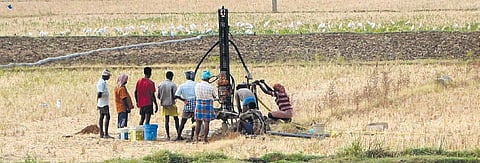

COIMBATORE: Indiscriminate sinking of borewells, sand mining and cultivation of water-intensive crops have resulted in depletion of groundwater in eight districts, though the State received copious rain in the last few years. Experts have appealed to the State government to regulate borewells and ban sand mining to prevent the situation from turning precarious.
According to a report published in October by the State Ground and Surface Water Resources Data Centre, the groundwater level dipped significantly in five western districts — Namakkal, Krishnagiri, Dharmapuri, Erode, and Tiruppur — two delta districts — Tiruvarur and Nagapattinam — and Thoothukudi in the Southern region. Namakkal was the worst affected with the level dipping by 1.58 m, the highest in the State, going down from 10.64 m in October 2020 to 12.22 m this year. Thoothukudi is second with groundwater dipping by 1.47 m from 8.77 m last year to 10.24 m now. The remaining districts showed an increase, but it was significantly low when compared to 2010 levels (table). Only Thanjavur fared better, improving from 14.00 m in 2010 to 2.56 m now.
Speaking to TNIE, S Raja, Executive Engineer of Ground Water Wing of PWD (TN) said, “When compared to rise in population and pace of urbanisation, ground water level has improved significantly, thanks to campaigns such as rainwater harvesting. “We calculate only the dynamic water level by analysing rainfall, recharge and extraction of groundwater in 1,500 bore wells and 4,000 open wells. We have the technology to assess static water level 500 m below the surface. Though the State has 75% of hard rocks and 25% sandy sub-surface, the groundwater pattern shows a good improvement,” he added.
Ayelai Sivasuryan, State executive committee member of TN Vivasayigal Sangam from Tiruchy, suggested that more check dams be built so the water table gets recharged. “When there is flow in the Cauvery, we get water at 30 ft, but when the river is dry, the level dips to 120 ft even in places within a 5 km radius. This is because of sand mining and drawing of water for drinking water projects.”
S Ravikumar, chief scientist of Water Technology Centre of TN Agricultural University said, “The western part of the State consists of hard rock, so borewells are dug for more than hundred feet. In the coastal northern districts, sedimentary rocks help recharge water. Rainwater harvesting system, better demand management and efficient use are important to improve water level.”
R Saravanan, Associate Professor of Center for Water Resources in Anna University said, “Naturally, 10-20% rainfall would be absorbed by soil and it is natural recharge. Additional recharge is artificial recharge. Around 39,000 tanks provide groundwater recharge in Tamil Nadu. Overall the State records 900 mm rainfall, so we are entitled to extract 10- 20% groundwater every year. Anything beyond this will lead to depletion.”
“Continuous cultivation of water intensive crop also contributed to depletion of ground water. Farmers should be sensitised to rotate the crop pattern so as to ensure there balance between extraction and recharge of water,” he added.
(In this series, TNIE focuses on the need to conserve water before it’s too late)